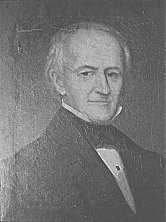Henry Hubbard
Henry Hubbard (born May 3, 1784 in Charlestown , Sullivan County , New Hampshire , † June 5, 1857 ibid) was an American politician and governor of the state of New Hampshire from 1842 to 1844 . Between 1829 and 1841 he represented his state in both chambers of Congress .
Early years and political advancement
Henry Hubbard initially enjoyed a private education and then attended Dartmouth College until 1803 . After studying law in Portsmouth , he was admitted to the bar in 1806. He then began his new profession in Charlestown.
In 1810 he became the "Town Moderator" leader of the town council in his hometown. He held this office a total of 16 times. Between 1812 and 1827 he was a member of the New Hampshire House of Representatives on several occasions . He was speaker of the house from 1825 to 1827 . From 1823 to 1828 he was also an attorney for Cheshire County , from 1827 to 1829 he was a probate judge in Sullivan County. In his early years Hubbard was a member of the Federalist Party . Later he joined the Democratic Party of Andrew Jackson .
Hubbard in Congress
With the help of his friend Levi Woodbury , Hubbard was elected as a Democratic Party candidate to the US House of Representatives in Washington, DC in 1828 . There he represented his state between March 4, 1829 and March 3, 1835. He became chairman of a committee that dealt with severance payments for veterans of the American Revolution ( Committee on Revolutionary Pensions ). In the congressional elections of 1834 he made the jump from the House of Representatives to the Senate . As a Class 2 Senator , he succeeded Samuel Bell on March 4, 1835 . In the Senate he was chairman of the committee that dealt with claims against the federal government ( Committee on Claims ). He completed his six-year legislative term until March 3, 1841, when he resigned from Congress. His Senate seat then went to Woodbury.
New Hampshire Governor
In 1842, Hubbard was elected the new governor of his state with 55.8 percent of the vote against Whig candidate Enos Stevens. After re-election in 1843, he was able to remain in office between June 2, 1842 and June 6, 1844. He advocated lowering property taxes for women and opposed the death penalty. Governor Hubbard also advocated lowering the federal government's high import tariffs.
Another résumé
Between 1846 and 1849, Hubbard was employed by the Federal Treasury in Boston . After that, he retired. Henry Hubbard died on June 5, 1857 and was buried in his hometown of Charlestown. He had five children with his wife, Sally Walker Dean.
Web links
- Henry Hubbard in the National Governors Association (English)
- Henry Hubbard in the Biographical Directory of the United States Congress (English)
- Henry Hubbard in the database of Find a Grave (English)
Individual evidence
| personal data | |
|---|---|
| SURNAME | Hubbard, Henry |
| BRIEF DESCRIPTION | American politician |
| DATE OF BIRTH | May 3, 1784 |
| PLACE OF BIRTH | Charlestown , New Hampshire |
| DATE OF DEATH | June 5, 1857 |
| Place of death | Charlestown , New Hampshire |



